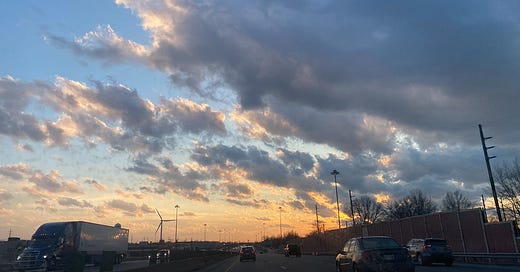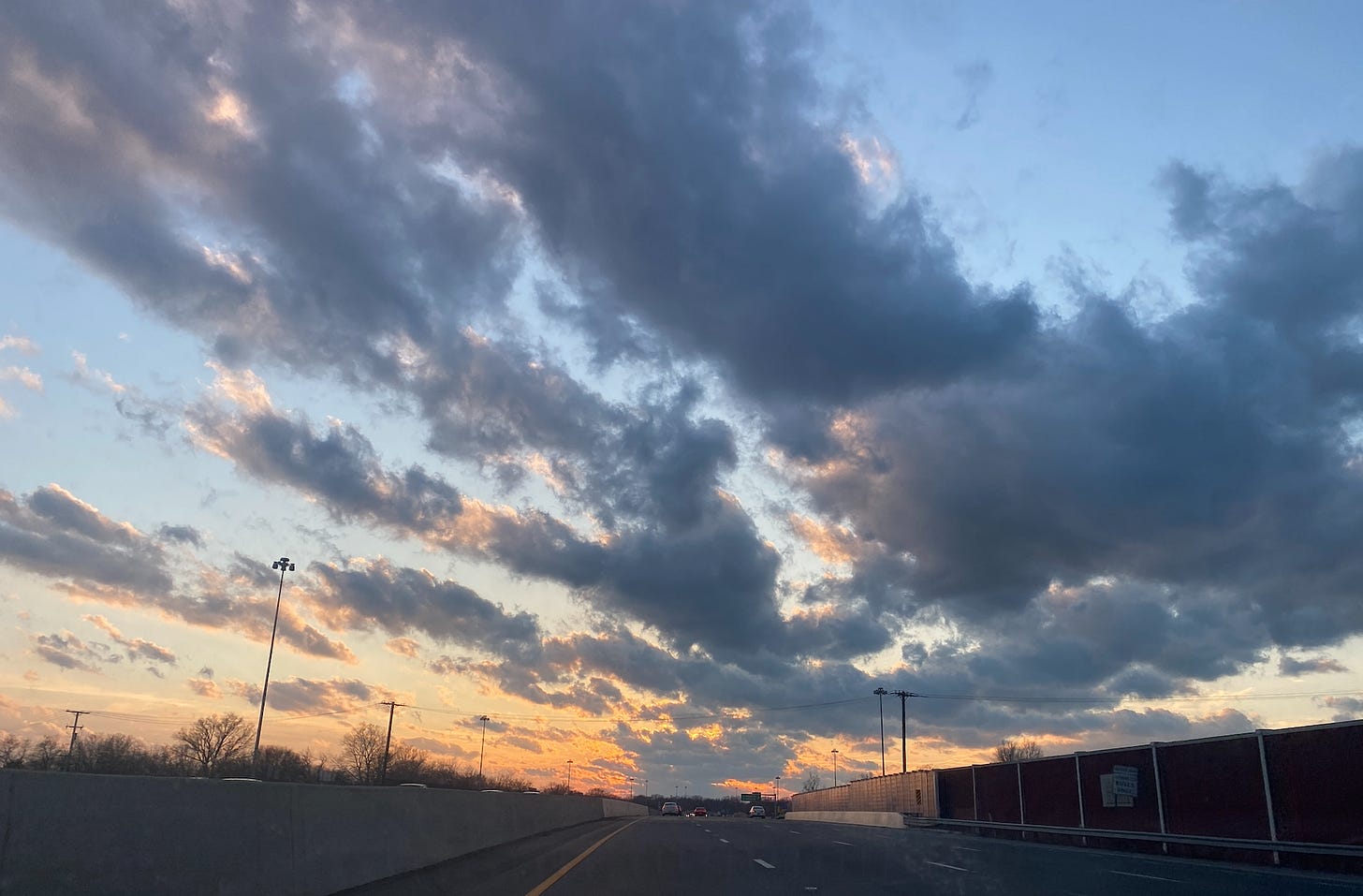Welcome all, and special hello if you’re new here. Thanks for diving IN DEEP SHIFT with me. It’s really a joy to share and connect with you. If you have found this work valuable to you and have the means, consider a paid subscription for $5/mo or $50 for the year. Think of it like buying me a decaf coffee or herbal tea to gently pick my heart-brain about spirit, dance, and art. Know that your monetary contribution supports my writing here on Substack as well as my creative work as a movement artist beyond our screens. With deep gratitude - emily
A couple weeks ago I wrote about how I could be a nun, kindof. Today, I share a bit of my background and current thinking around spirituality and religion. It’s in three little chunks, connected but not linear, which is probably an accurate reflection of my thinking.
This title may be slightly misleading because I’m not neatly defining and plucking apart spirituality and religion entirely. It helps me to think of them as intermingled threads across history, society, and the inner world of each human. But can they be completely separated? Religious but not spiritual, spiritual but not religious. I’d always say I’m the latter. But I’m questioning my desire to create a stark binary.
From an embodied place, what might it feel like to unwind religion and spirituality in my own personal history? How does this mirror what’s happening in the world? I feel a bit vulnerable as I expose crossed thought patterns, meandering memories, and unfinished research.
Many things have brought me a place of deep curiosity of the metaphysical: needing support for my inner life; searching for meaning in the modern world; nurturing balance and nuance for my critical justice-seeking mind; cultivating my contentment and joy; needing community; and following my heart towards movement, art, contemplation, and rage.
Maybe it had to do with going through my Saturn return during a global pandemic, or just being a human, but the past couple years have brought me to my knees, so to say (you too?).
My family’s religious lineage is Catholicism; this is the church I grew up in. I attended parochial school through 8th grade and did the whole thing: went through the sacraments of baptism, first community, reconciliation, and confirmation; attended mass regularly; and celebrated holidays with family. All-in-all, we were casual Catholics. While my family was relatively active for some time, I never felt threatened for questioning and relaxing my participation during high school years. It was a slow drift; I had other priorities over Sunday mass. The drift wasn’t just apathetic; my feminist consciousness grew critical of the position of women in the Catholic Church, the shame-y feeling I would get after some homilies, and the rejection and judgment of LGBTQ people.
Sweet memories of growing up Catholic: A sense of community; Singing! ; amazing parish festivals that I looked forward to every summer of my childhood; intergenerational connection- my grandparents were very involved in our church; rhythms and rituals of the year- advent calendars and donuts before Ash Wednesday.
Less sweet memories that I continue to unravel in my body: Catholic guilt - as an 8 year old I had to confess my sins! ; abstinence-only indoctrination that kept me ignorant and scared of our bodies; white Jesus; hierarchical relationships between teacher and student / priest and everyone else; theologies of original sign and evil; Catholic piousness and Christian supremacy- this is the one and only way.
In college, I mostly ignored religion for myself. Turned off by the culty Christian groups on campus and never drawn to the Catholic services, my attention was elsewhere - on homework, activism, and dance. I didn’t need it at the time and my values were shifting - I was fulfilled and busy with collegiate, social, and student activist life. At some point in college, I did have curiosity about interfaith dialogue and cultivated some spaces for this, inviting in acquaintances who were Sikh, Jewish, and Muslim. It’s interesting, I don’t think I would have identified as Christian in these spaces. I probably felt like a neutral party - just curious, not religious or connected to a specific faith. But really, I wasn’t ready to begin looking at my religious roots nor was I in community with others who were doing this.
Though I do recall a little breakdown I had, maybe my junior year. Something had landed me in my advisor’s office, crying and stressed out. I remember her lending me her copy of the Tao Te Ching1. I read it curled up in the lofted bunk of my dorm room, probably most of the poetic and cryptic messages sailed right past my working memory. In reflection, I see it as an early seed of spiritual curiosity.
Christianity has a messy, violent history. It took time and community for me to begin to question and critique. It will take more time and community to continue unraveling it’s impact on our bodies, our nervous systems, and our societal systems, and to embark on reparative action.
During a brief love affair with a sweet Jewish guy this past year, we fit in a depth of conversation about religion, spirituality and faith. He shared his prayers with me, his Shabbat practices, and community dialogue around ecology and decolonialism in the context of Judaism.
I remember him saying something like: believing in a faith system is like agreeing to a set of rules for this wild, mysterious game of life.
There’s something about that that’s stuck with me - like, it’s not about any one religion being Correct or the Ultimate Truth. But that any religion or faith system offers one practices, rituals, community and strategies to live well. Ideally, it’s a choice we can make individually and in community.
Mapping out rules and direction for how to survive is a site of power. We humans crave answers and solutions to living well, to our sorrows, to our desires. When this power is the hands of an institution outside of ourselves and our community, the possibility for faith systems to be use for manipulation, dehumanization, and violence seems more likely. I’m curious how this is true not just for religion but for other shared structures of society.
If you ever listen to On Being with Krista Tippett, you have heard her ask her interviewees– dozens of philosophers, scientists, artists, poets, and more– what was the spiritual foundation of your childhood?
In my imagined conversation with Krista, I’d share some of the influences of my Catholic upbringing. But diving a bit deeper, I’d want to tap into my inner life as a child, this soft expansive place that is full of little seeds I’m tending to and getting more curious about now.
I think about my sister and I speaking prayers into our dark room at bedtime as we lay in our twin beds, staring at the ceiling and asking God to bless our loved ones. I think about hours spent at my grandparent’s home wandering their spacious backyard and the woods just beyond. Getting lost, playing in the dirt and creek, making up worlds with my siblings and neighbor kids. I think about large holiday parties at our house, the excitement of welcoming and feeding a bunch of people we love. I think about my desire to befriend many different kinds of people and stand up for the underdog of middle school social dynamics. I think about the quiet voice within me that felt like I knew something even as a kid, that I had something to say and share with the world.
I focus on nurturing the heart muscle that can embrace complexity, nuance, and change in myself and those around me. This heart muscle can sit with deep belly discomfort and face paradox, violent histories, and the depths of love. This feels so important when addressing matters of spirit and religion.
With curiosity and openness,
Emily
not the copy I was given at this time, but I highly recommend Ursula LeGuin’s poetic Tao Te Ching: A Book about The Way and the Power of The Way






